|
|
|
Sort Order |
|
|
|
Items / Page
|
|
|
|
|
|
|
| Srl | Item |
| 1 |
ID:
187377
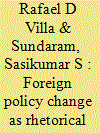

|
|
|
|
|
| Summary/Abstract |
Although the recent advancements in critical constructivist IR on political rhetoric has greatly improved our understanding of linguistic mechanisms of political action, we need a sharp understanding of how rhetoric explains foreign policy change. Here we conceptualize a link between rhetoric and foreign policy change by foregrounding distinct dynamics at the regional and domestic institutional environments. Analytically, at the regional level, we suggest examining whether norms of foreign policy engagement are explicitly coded in treaties and agreements or implicit in conventions and practices of actors. And at the domestic level, we suggest examining whether a particular foreign policy issue area is concurrent or contested among interlocutors. In this constellation, we clarify how four different rhetorical strategies underwrites foreign policy change – persuasion, mediation, explication and reconstruction – how it operates, and the processes through which it unfolds in relation to multiple audiences. Our principal argument is that grand foreign policy change requires continuous rhetorical deployments with varieties of politics to preserve and stabilize the boundaries in the ongoing fluid relations of states. We illustrate our argument with an analysis of Brazil’s South-South grand strategy under the Lula administration and contrast it against the rhetoric of subsequent administrations. Our study has implications for advancing critical foreign policy analysis on foreign policy change and generally for exploring new ways of studying foreign policies of nonwestern postcolonial states in international relations.
|
|
|
|
|
|
|
|
|
|
|
|
|
|
|
|
| 2 |
ID:
187373
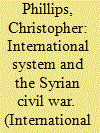

|
|
|
|
|
| Summary/Abstract |
How does the international system impact a civil war? Does polarity affect the war’s outbreak, character and how long it lasts? Systemic Realists argue multipolarity makes inter-state war more likely, but is this also true of intra-state war? Using the Syria conflict (2011-present) as a case study, this article suggests a connection can be found. It argues that the end of US-dominated unipolarity, and its interaction with a new multipolarity in the Middle East region impacted the behaviour and calculations of foreign states involved, contributing to the outbreak of war and how it progressed. The same interacting multipolarity paradoxically also shaped Russia’s decision to intervene in 2015, ultimately edging the war towards a conclusion, something that Systemic Realists would not expect. This study of the systemic effects in the Syria conflict suggests that the Neo-Realist concept of polarity continues to have relevance and can be useful in understanding intra- as well as inter-state conflict. It points to the importance of the interaction between regional and global systems in generating these effects, and it suggests a reconsideration of the Neo-Realist view that multipolarity always makes wars harder to end.
|
|
|
|
|
|
|
|
|
|
|
|
|
|
|
|
| 3 |
ID:
187372
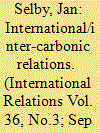

|
|
|
|
|
| Summary/Abstract |
If international relations can be theorised as ‘inter-textual’, then why not also – or indeed better – as ‘inter-carbonic’? For, not only is the modern history of carbon to a large degree international; in addition, many of the key historical junctures and defining features of modern international politics are grounded in carbon or, more precisely, in the various socio-ecological practices and processes through which carbon has been exploited and deposited, mobilised and represented, recycled and transformed. In what follows I seek to make this case, arguing that carbon and international relations have been mutually constitutive ever since the dawn of modernity in 1492, and that they will inevitably remain so well into the future, as the global economy’s dependence on fossil carbon continues unabated and the planet inexorably warms. Will climate change generate widespread conflict, or even civilisational collapse? How are contemporary power dynamics limiting responses to climate change? And how, conversely, might 21st-century world order be transformed by processes of decarbonisation? Building on research in political ecology, I argue that a dialectical sensitivity to ‘inter-carbonic relations’ is required to properly answer these questions. Scholars and students of International Relations (IR), I suggest, need to approach climate change by positioning the element C at the very centre of their analyses.
|
|
|
|
|
|
|
|
|
|
|
|
|
|
|
|
| 4 |
ID:
187374


|
|
|
|
|
| Summary/Abstract |
What factors explain variation in decisions to use force in American foreign policy? Consider the Obama administration’s decision to intervene in Libya. Upon assuming office, Obama outlined a foreign policy marked by a self-professed doctrine, ‘don’t do stupid shit’. In short, Obama sought to avoid the unnecessary use of military force, but when the threat of mass atrocity emerged, despite strong protests from senior advisers, he became drawn into the 2011 Libya intervention. By contrast, following chemical weapon attacks in Syria in 2013, Obama reneged on upholding his so-called ‘red-line’, pursuing diplomatic measures even though support for a military response was strong. But what explains this variation? Rationalist perspectives across the board have tended to overrate interpretive efficiency. Yet, such assumptions obscure the capacity for interests to be interpreted in different ways. To redress this issue, I build on discursive institutionalist insights, developing a model to show how principled and cognitive ideas act as weapons in institutional debates, serving to repress or displace information. To show how agents come to rely on principled or cognitive ideas, I develop a three-part model offering two mechanisms – cognitive repression and normative displacement – by which agents displace and repress certain types of information, depending on the ‘form’ in which that information is presented. This enables a more comprehensive understanding of how different interpretations lead to policy variation at critical moments of decision.
|
|
|
|
|
|
|
|
|
|
|
|
|
|
|
|
| 5 |
ID:
187379
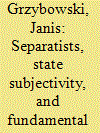

|
|
|
|
|
| Summary/Abstract |
Ontological security studies (OSS) in International Relations (IR) emphasize the role of identity, anxiety, and a sense of self in world politics. Yet suggesting that states act in certain ways because of ‘who they are’ also assumes that they are in fact states. In this article, I problematize the presupposition of state subjects in the context of separatist conflicts in which claims to statehood compete and overlap. Where unrecognized de facto states are pitted against their unyielding parent states, the two threaten each other’s very state personhood, thereby presenting a more radical challenge to their existence than traditional ‘physical’ and ‘ontological’ security threats. Separatist conflicts thus reveal a widely overlooked dimension of fundamental ontological security, provided by the constitution and recognition of states as such. Moreover, because of the exclusiveness of state subjects in the modern international order, any third parties attempting to resolve such conflicts inevitably face a meta-security dilemma whereby reassuring one side by confirming its claim to statehood simultaneously renders the other side radically insecure. Thus, rather than regarding particular state subjects as merely the starting point of quests for ontological security in international relations, they should also be understood as already their result.
|
|
|
|
|
|
|
|
|
|
|
|
|
|
|
|
| 6 |
ID:
187378


|
|
|
|
|
| Summary/Abstract |
The paper explores the cases of denuclearized countries, namely Belarus, Kazakhstan, South Africa, and Ukraine and primarily intends to answer the questions of how (process), why (reasons for denuclearization), and for what (benefits and gains) did these four countries abandon their strategically advantageous nuclear arsenals. For conceptual analysis, ‘a trading state’ is employed, for they commonly faced the imminent need of guaranteeing state sovereignty and the influence of changing security dynamics. The four cases exhibit both generalizable commonality and distinctive experience in the process of denuclearization. They demonstrate that two mutually-reinforcing forces, ‘global-scale structural change in world politics’ and ‘pressure for regime creation or change’, interactively led to the final decision to enact complete denuclearization, albeit not effortlessly. Furthermore, unveiling the differences in the process of denuclearization – in terms of resistance, negotiation tools and leverage, stage of nuclear development, domestic-grown technology, internal justification for legitimacy – helps to clarify the gains and benefits received in return for denuclearization. Shedding light on these four countries, under pressure from nuclear weapons states, complements conventional realism-leaning interpretations of nuclear politics and offers policy insights to understand countries with nuclear ambition in contemporary world politics.
|
|
|
|
|
|
|
|
|
|
|
|
|
|
|
|
| 7 |
ID:
187375
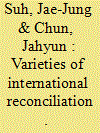

|
|
|
|
|
| Summary/Abstract |
After conflict, states occasionally succeed in reconciling with former adversaries. When they do, they do so in different ways. Some grudgingly sign a treaty to signal the end of a conflict. Others provide for not only reparations and compensations but also economic assistance as material evidence of reconciliation. Yet others offer apologies, official and unofficial, and engage their former adversaries in reflective dialog that transforms their relationship from enmity to amity. Is there a way to systemically organize different ways in which states reconcile? Can different types of reconciliation be identified? If so, what explains the types? We address these questions in this article. Based on our survey of war terminations in the post-World War II period, we identify four different types of reconciliation that former injurious states have made with their victim states – procedural, material, ideational, and substantial. We hypothesize that their choice of a reconciliation type can be explained in terms of a configuration of national interest and national reflection. In this article, we engage in a structured comparative analysis of the cases of reconciliation between France-Algeria, Japan-Korea, Germany-Czechoslovakia/Czech Republic, and Germany-Poland – that we argue closely resemble the four ideal types – and demonstrate that our hypotheses are confirmed. We conclude with a consideration of how likely it is for ideational and material reconciliation to develop into substantial reconciliation
|
|
|
|
|
|
|
|
|
|
|
|
|
|
|
|
| 8 |
ID:
187376


|
|
|
|
|
| Summary/Abstract |
Regional cooperation in Asia takes place in formal Regional Organizations (ROs) as well as in less formal Regional Fora (RF). In addition, unlike in other parts of the world, Asian regionalism mainly developed in one instead of two waves. Especially after the end of the Cold War, Asian countries created numerous ROs and RF. Over time, Asian states became members of several ROs and RF at the same time, thereby contributing to Asian regime complexity. Given that multiple memberships in regional cooperation agreements can place high demands on diplomatic and financial resources of member states, the fact that Asian states became members in between one and 17 ROs and RF is puzzling. This article investigates why Asian countries join regional cooperation agreements. Based on a theory-guided empirical analysis that combines quantitative and qualitative methods, it argues that hedging and economic interests are the main driving forces behind Asian regionalism and that these motivations are often interlinked.
|
|
|
|
|
|
|
|
|
|
|
|
|
|
|
|
|
|
|
|
|